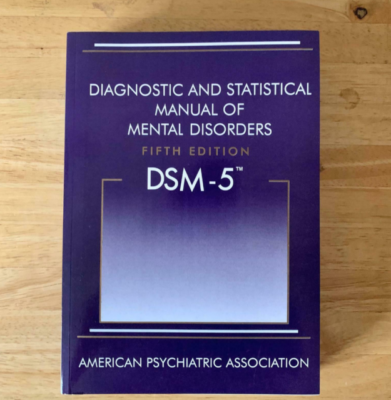The term “mental illness” has gained near-ubiquitous status in our daily lives. Once a rarity among friends and relatives today it seems those without a mental illness are in the minority. Among the flagship mental illnesses are depression, ADD/ADHD, and gender dysphoria.
The field of psychology, considered a soft science, has sought to validate itself among the sciences with its Diagnostic and Statistical Manual (DSM). The DSM is a rather weighty tome filled with categorical entries for virtually every mental illness one can think of, which may be part of its problem.
A 2020 presentation given by Dr. James Davies (PhD), Co-Founder of the Council for Evidence-Based Psychiatry, details the history of the DSM while exposing its un-scientific structure and many financial entanglements of its contributors. His concern rose among the many similarly disturbed voices within the practices of psychology and psychiatry who saw their disciplines being compromised by bad medicine. Namely, Dr. Davies and his colleagues noticed that their understanding of mental illness felt more like an illusion rather than a proper diagnosis, and much of the preferred treatments rested on weak evidence, poor causal links, and a heavy reliance on pharmaceuticals.
The history of systematic mental illness diagnoses goes back to the 1800s. In 1844, the Association of Medical Superintendents of American Institutions for the Insane was formed. In 1860, Florence Nightingale made a proposal for an international practice of systematically gathering statistics per medical diagnoses and care. By 1872, the American Medical Association published its first Nomenclature of Diseases with a section devoted to Disorders of the Intellect, though its use was short-lived. By World War 2, the influence of the American military was felt. Much of the use of psychological terminology and diagnoses was run through the office of the Surgeon General, and military psychiatrists worked in coordination with Hospitals to develop Medical 203, the new standard of categorization. In 1948, the World Health Organization intervened by taking over the International List of Causes of Death (ILCD) and renamed it the International Statistical Classification of Diseases (ICD). The APA was then commissioned to develop a US-based manual that birthed the first DSM in 1952.
The 1960s saw the rise of social change agents impacting the veracity of one particular disorder – homosexuality. Prior to the research of Evelyn Hooker, it was deemed a type of “sociopathic personality disturbance”. Based on the findings of her lone study where she compared the reported mental well-adjusted nature of homosexual to heterosexual men were essentially the same, homosexuality was down-graded to “sexual orientation disturbance.” However, this was not the result of etiological discovery, but the combination of Hooker and Alfred Kinsey’s highly controversial work and pressure from activists gathered at the site of the 1974 DSM convention in San Francisco. As the panel discussed the matter, activists shouted down and ridiculed those who deemed it a mental disorder. Rather than a matter of scientific discovery and analysis, the change was the result of a paucity of medical research combined with social pressures from unqualified activists. Dr. Davies speech notes this pattern of modification continues to this day; only now the influence over psychiatric medicine include the interests of large-scale pharmaceutical interests.
Seeking to understand the development of today’s DSM, Davies reached out to the chair of the DSM-III task force, Robert Spitzer. Spitzer spent most of his time in practice at Columbia University in New York. Now living in Princeton, NJ, he agreed to meet with Davies to enlighten him about his involvement in the advancement of the DSM. Among his admissions were the criteria for determining changes to psychiatric categories that simply arrived as the result of a democratic vote. This is not science, points out Davies. Among the anecdotes he learns, those tasked with determining appropriate nomenclature and symptoms were hand-selected professionals who sat in meetings and debated the merits until they reached consensus. The similarity to the terminology used by Dr. Anthony Fauci during the COVID pandemic, where he likened himself to “the science,” with science also being identified via consensus rather than falsifiable evidentiary results that can be replicated by other scientists helps the laity see the “science” of psychology could easily go off the rails of the crazy train otherwise known as pseudo-science.
Like we’ve learned with Fauci and Big Pharma, thanks to internal whistle-blowers and external critics like Robert F. Kennedy Jr., there are strange bedfellows who were never intended to share the same room. The integrity of science, as well as commerce, is upheld by non-interested third-party agencies intended to give accountability for the purpose of best practices and best outcomes. Davies discovered this same type of medical incest, which sullies the good work of actual medical science. In one case, he notes Astra-Zeneca used a questionable DSM condition called “Premenstrual Dysphoric Disorder” to release a drug targeting women who presented as such. Claiming a new medication would help treat it the company made billions in sales to women whom Davies states were suffering from completely normal female hormonal issues and not a disorder. It turns out the new medication wasn’t new at all but was simply re-named re-packaged Prozac. This was also not a one-off occurrence.
As I researched the history of the DSM, I came across this entry from Wikipedia (equally questionable as a scientific source, however, this illustrates the point):
“Obscuring the Root Causes of Psychological Distress
The role of the DSM-5 in protecting the interests of wealthy and politically powerful owners of the means of production in the United States has been criticized as well.[113] Placing the blame for predictable and common psychological distress caused by the deleterious effects of economic inequality in the United States on individuals by attributing it to mental pathology has been criticized as hindering change of the root causes of the distress.[113] “
The citation [113]? Zeira A (February 2022). “Mental Health Challenges Related to Neoliberal Capitalism in the United States.” Community Mental Health Journal. 58

This entry uses the language of Karl Marx to criticize the entire field of American psychiatric medicine. It also raises the question – who is behind the Community Mental Health Journal and should they be included among those worth citing? One is reminded of the Greivance Studies Affair exposing the rise of quasi-academic journals. Perhaps the most egregious was feminist studies journal Afilia: Journal of Women and Social Work acceptance of a re-write of the thirteenth chapter of Hitler’s Mein Kampf replacing “Jews” with “men”.
Curiously, the author of Political Ponerology noted Karl Marx exhibited “schizoidal personality disorder” as he and his fellow students of psychology observed the machinations and abuses of communism among their populace. People with schizoid personality disorder exhibit a marked lack of emotion, lack of motivation, and almost no desire to form relationships with others. In other words, the entry is the pot calling the kettle black by virtue of the inmates taking over the asylum, if you’ll allow the mixed metaphors. Where is this headed?
Just this week we saw the release of the Covington school shooter’s manifesto. In it we see their notes riddled with vitriol using the language of woke ideology (re: cultural Marxism), which explains her desire to kill “crackers” and children, even praying God would bless her slaughter to achieve a high body count.
 How does this relate to the DSM?
How does this relate to the DSM?
The DSM-V was the top-selling book on Amazon upon its release. It currently holds the top five spots in Amazon’s psychiatric category. It also generates most of the operational costs of the American Psychiatric Association, around six million dollars each year. When Davies asked to speak with the contributors to DSM-V, he was denied as they were all forced to sign confidentiality agreements. This lack of transparency for such a significant influencer of America’s mental health is alarming.
Rather than hold itself together with scientific rigor, it has indeed been captured by those seeking to control the means of production, in this case, the production of sound mental health criteria, and in the process, they are normalizing pseudo-science and, by proxy, mental illness.
Davies also noted Autism has now been redefined to limit the spectrum in the DSM-V; it’s simply no longer a diagnosis for many who may, in fact, have it. Odd that the industry that has been successfully sued for causing autism via vaccines also has its financial tentacles entwined in this quasi-medical manual and enjoys the benefit of this disappearing act.
Furthermore, each DSM grows in the number of mental illnesses and sub-categories it lists. Thus, if this is the standard, it explains in part why we hear of our mental health crises, as it is both real and manufactured.
Dr. Davies believes we need to scrap the DSM and start over. As someone who has several family, friends, and clients who struggle with mental illness, I couldn’t agree more.
